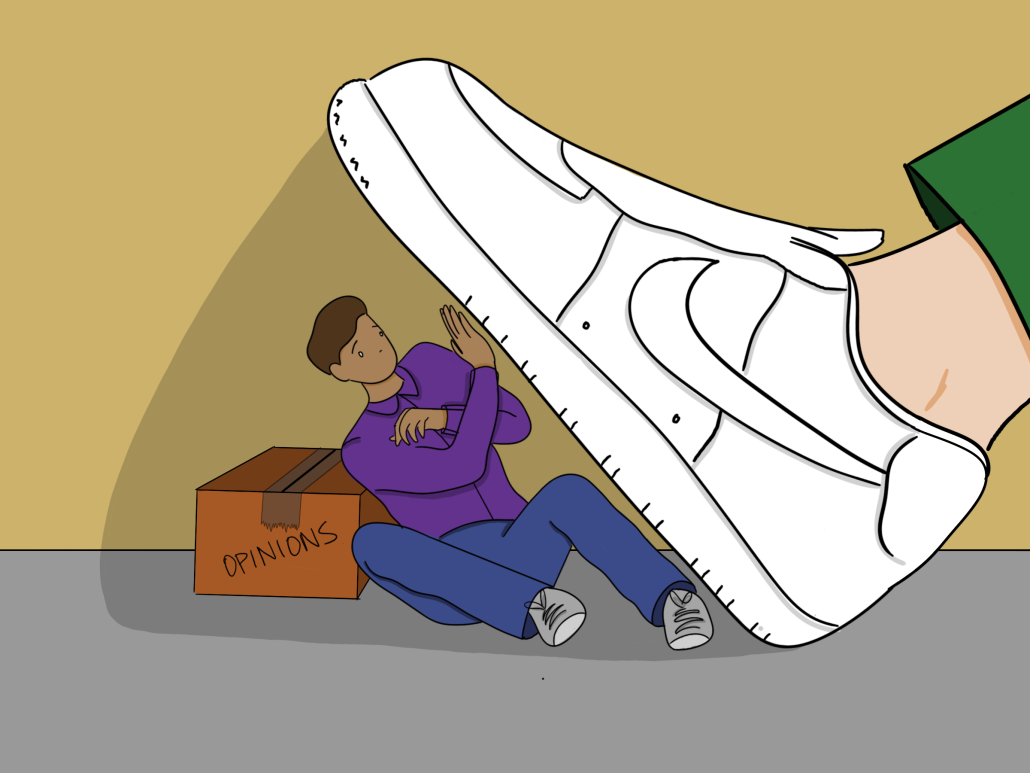Letter From the Editor: When did opinions cause conflict rather than start conversations?

People don’t know how to have an opinion. Correction: I don’t think people know how to have an opinion. Pretty presumptuous and bold of me to say considering I’m the opinion editor. However, I can say this because of my experiences on the job.
For the past three semesters, it has felt as though I have had to constantly remind others what an opinion is. For reference, according to the Merriam-Webster dictionary, an opinion is a “belief stronger than impression and less strong than positive knowledge,” something that “implies a conclusion thought out yet open to dispute.”
But when I hop on social media these days, nothing feels thought out and comments sharing different perspectives spark conflict rather than conversation. Things that should be up for dispute are not, and things that are backed with empirical evidence seem to face scrutiny. I’m sorry but the world is not flat. If Aristotle knew this back in 350 B.C., we should probably move on.
As a columnist, I was prepared for discourse and conversation regarding my articles. I knew others wouldn’t always agree with my opinions, but that wasn’t a problem I had to resolve. It was an opportunity for me to share my thoughts and hear others’. But it becomes exponentially difficult to do so when all you hear are screams saying, “You’re wrong.” As an editor, I hear the public telling my writers that they are wrong, harassing them to a point where they are discouraged to write despite their will, vigor and thoughtfulness.
I do my best to learn from my mistakes, admit them and do my best to resolve them – a positive side effect of my anxiety. If someone disagrees with an assertion I’ve made, however, that doesn’t mean my point was a mistake.
Throughout all the pieces in the opinion section and of my own work, including this one, the author is neither right nor wrong because, for the most part, I write not to prove a point and win an argument, but to sort out the pandemonium that is my mind and to find solace in my work. While I can’t change how others think, I can listen and share my own thoughts.
I’m now at a point in my life where I’ve realized that it’s not my mind that is in pandemonium, it’s the entire world. We’ve altered definitions and meanings of words to degrade the idea of one being entitled to an opinion to mean one has the right to say and believe whatever they want and impose it onto others.
It feels as though we can no longer have meaningful conversations without them devolving into chaos. When I shared with my ex that I didn’t like tomatoes, instead of taking it for face value, he would force me to eat them in an attempt to desensitize me to the taste. Maybe that’s why we aren’t dating anymore. I think I hate tomatoes more now.
We have become so polarized in our way of thinking that any difference in thought is seen as a personal attack. We aren’t making any progress politically or socially by screaming at each other and calling each other delusional. I can’t seem to scroll through TikTok without finding out there’s a new sociopolitical issue tearing down yet another influencer for not being “woke” enough. But at the end of the day, hate and cancel culture change absolutely nothing.
Back in 2020, at the height of the Black Lives Matter movement, a crowd of protesters confronted a woman seated outside a restaurant on 18th Street NW in Adams Morgan for not raising her fist in solidarity with the movement. When she refused, the protestors surrounded her and it was almost like a scene out of “The Handmaid’s Tale,” accomplishing nothing more than showing an example of white privilege.
Bullying someone into submission and reacting in fear and anger only pushes others away further, making them afraid to share their own opinions. I mean, would you listen to someone if they were screaming and attacking you?
With the world fitting on the screen in our hands, we think we see everything there is. But it’s important to remember that our screens are catered to our own beliefs, reinforcing our own biases and only showing us what we want to see unless we actively seek out other perspectives. So, no, you’re not “right,” people are simply agreeing with you, which means others are allowed to disagree with you.
In his Farewell Address on Jan. 10, 2017, discussing democracy and the ties that bring us together, Obama said, “We weaken those ties when we allow our political dialogue to become so corrosive that people of good character aren’t even willing to enter into public service; so coarse with rancor that Americans with whom we disagree are seen not just as misguided but as malevolent.”
It’s easier to say that someone is wrong than to put yourself in a position that allows your beliefs to be challenged. It’s safe to stay within the confines of our curated “for you” page and feed, but, in allowing our thoughts to go unchallenged, we find ourselves selectively choosing facts that become self-destructive.
Obama went on to say that “Politics is a battle of ideas. That’s how our democracy was designed … But without some common baseline of facts, without a willingness to admit new information, and concede that your opponent might be making a fair point, and that science and reason matter … we’ll make common ground and compromise impossible.”
What is the worst thing that can happen if you just listen to what another person has to say? What is the worst thing that will happen if you just let yourself learn something new and step into someone else’s shoes? Not everything has to be a fight, it can just be a conversation if we allow it to be.

